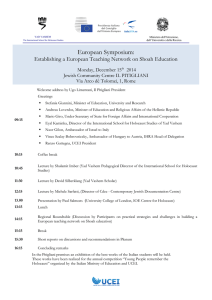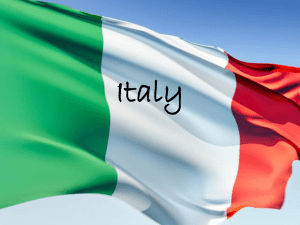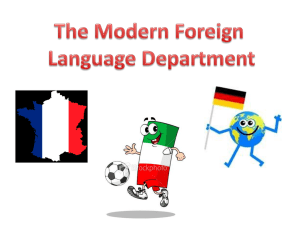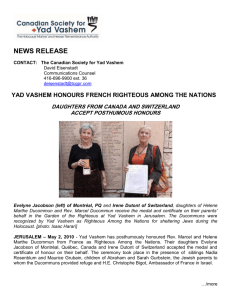Read more - Centro Primo Levi
advertisement
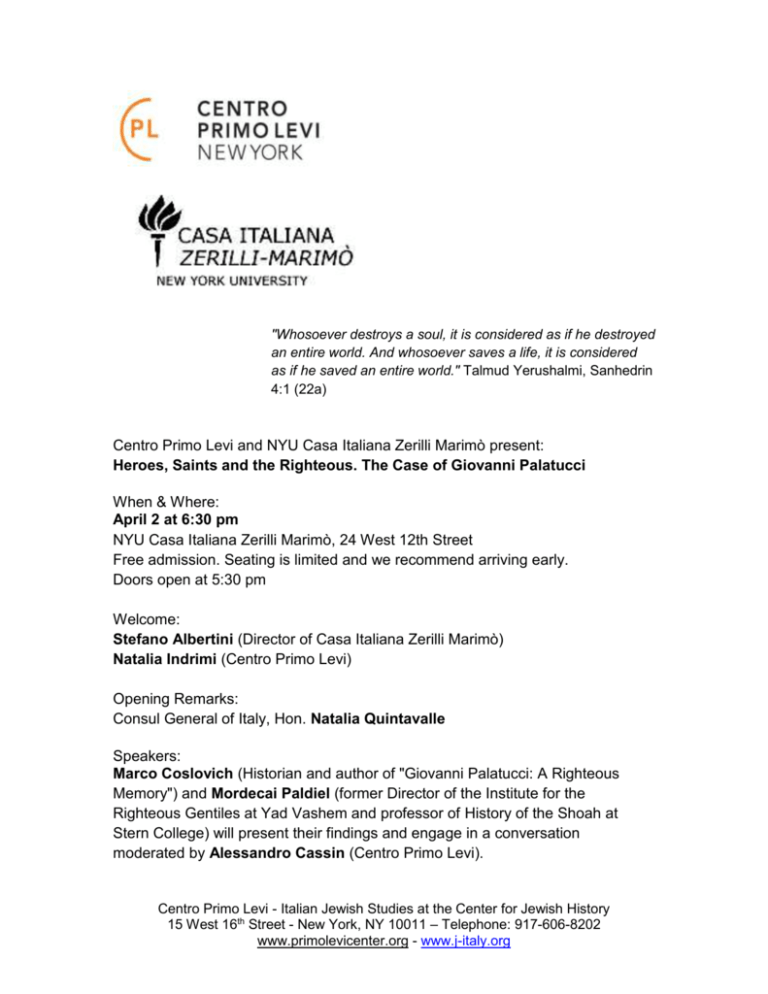
"Whosoever destroys a soul, it is considered as if he destroyed an entire world. And whosoever saves a life, it is considered as if he saved an entire world." Talmud Yerushalmi, Sanhedrin 4:1 (22a) Centro Primo Levi and NYU Casa Italiana Zerilli Marimò present: Heroes, Saints and the Righteous. The Case of Giovanni Palatucci When & Where: April 2 at 6:30 pm NYU Casa Italiana Zerilli Marimò, 24 West 12th Street Free admission. Seating is limited and we recommend arriving early. Doors open at 5:30 pm Welcome: Stefano Albertini (Director of Casa Italiana Zerilli Marimò) Natalia Indrimi (Centro Primo Levi) Opening Remarks: Consul General of Italy, Hon. Natalia Quintavalle Speakers: Marco Coslovich (Historian and author of "Giovanni Palatucci: A Righteous Memory") and Mordecai Paldiel (former Director of the Institute for the Righteous Gentiles at Yad Vashem and professor of History of the Shoah at Stern College) will present their findings and engage in a conversation moderated by Alessandro Cassin (Centro Primo Levi). Centro Primo Levi - Italian Jewish Studies at the Center for Jewish History 15 West 16th Street - New York, NY 10011 – Telephone: 917-606-8202 www.primolevicenter.org - www.j-italy.org About the program: In the past ten years, the topic of “rescuers” has generated remarkable interest in the historiography of the Shoah in Italy. Within this trend, the case of Giovanni Palatucci holds a special place. Giovanni Palatucci, a police officer at the Questura in Fiume between 1937 and 1945, was arrested by the Nazis and deported to Dachau where he died. Since 1953, the city of Ramat Gan in Israel, followed by the Catholic Church, the Union of the Italian Jewish Communities, the Italian Police, the ADL and the Raul Wallenberg Foundation, have identified Palatucci as a hero who allegedly saved thousands of Jews. In 1990 Yad Vashem conferred him the title of Righteous Among Nations. In spite of the scarcity of historical documents supporting the narrative of his life and death, these acts of recognition coming from such diverse entities, created a chain in which each recognition seems based on the previous one, rather than grounded in historical proof. He is the only Italian rescuer who appears in US curricula on the Holocaust. On March 21st, 2000, the Vicariate of Rome emitted an edict for the initiation of his beatification process. While politicians and educators compete in pointing to him as an example of courage, humanity and a symbol for the Italian people, under the lens of historical research, numbers, dates and documents do not substantiate what has become his "official story". Of the 498 Italians recognized by Yad Vashem and whose stories are supported by much stronger documentation, none has been the object of such national and international interest. Through this process of mass glorification, what was likely a story of courage and humanity documented by Yad Vashem, has taken a life of its own in the popular imagination. It started an ever-growing “rescue” mythology, seemingly in an attempt to provide a retroactive counterpoint to the Nazi extermination machine. It took decades to assess the magnitude of the Nazi extermination project and decades to collect, compare and check thousands of testimonies against surviving documents. As the last witnesses of the Shoah are dying off, the preservation of their memory requires further historical research, with equal standards used to reconstruct the history of survival and rescue. The scholarship dedicated to the relatively small phenomenon of the "rescuers" is still in its infancy. Centro Primo Levi - Italian Jewish Studies at the Center for Jewish History 15 West 16th Street - New York, NY 10011 – Telephone: 917-606-8202 www.primolevicenter.org - www.j-italy.org Yad Vashem conducts a thorough research to recognize a designated “righteous” and requires, among other criteria, direct testimonies. However, this recognition often resonates well beyond the strict humanitarian and historical sphere and ends up dovetailing with such popular notions as "hero" and "saint". Is the case of Giovanni Palatucci emblematic of the ambiguities posed by a notion of righteousness that means different things to different people and interest groups? How does the Jewish notion of Hasidei Umoth Ha'olam (Just Among the Nations of the World, i.e. followers of the laws of Noah) intersects with that of Hero, fundamental in the founding of nations, and that of Saint which epitomizes the overcoming of human limits for the Catholic faith? This program focuses on the most famous of the Italian rescue cases, in which the recognition of “righteousness” opened the way to both the making of a popular hero, as well as a beatification process. Based on the existing documents, historian Marco Coslovich and former director of the Institute of the Righteous at Yad Vashem, Mordecai Paldiel, will discuss the case of Giovanni Palatucci in an attempt to reconstruct his life in Fiume and his interaction with the Jewish population, as well as examine the process that afforded him the recognition of “righteous among the nations”. About the speakers: Dr. Mordecai Paldiel, the former Director of the Department of the Righteous at Yad Vashem, teaches History of the Shoah at Stern College and History of the 20th Century at Touro College. Dr. Paldiel, a leading authority on rescue during the Holocaust, has written several books including The Path of the Righteous: Gentile Rescuers of Jews during the Holocaust, Whosoever Saves One Life: The Uniqueness of the Righteous Among the Nations and Sheltering the Jews: Stories of Holocaust Rescuers and German Rescuers of Jews - Individuals versus the System. In 1991, Dr. Paldiel was the Ida E. King Distinguished Visiting Scholar of Holocaust Studies at the Richard Stockton College of New Jersey. He received a B.A. from Hebrew University and an M.A. and Ph.D. in Religion and Holocaust Studies from Temple University. Dr. Marco Coslovich is an historian and educator based in Trieste. He is an expert in the memory of the deportation and on the concentration camp of Dachau. He has published books on the Nazi extermination camps, totalitarianism, and the Fascist persecutions of the Jews. He is president of the organization “Historical Perspectives” and director of the oral history project “The Centro Primo Levi - Italian Jewish Studies at the Center for Jewish History 15 West 16th Street - New York, NY 10011 – Telephone: 917-606-8202 www.primolevicenter.org - www.j-italy.org Last Roll Call”, which collects video interviews with survivors of the Fascist, Nazi, and Communist regimes. Among his best known books are: Gli anni negati, F.K.L. - on the experience of deportation from a woman’s perspective, Nemici per la pelle, on divided historical memories, Come amare le viole del pensiero?, Dio non c'era a Ravensbruk - the diary of Nora Pincherle. In 2008 Coslovich published Giovanni Palatucci: a Fair Memory, the result of 15 years of research on Giovanni Palatucci. The book examines and reframes Palatucci’s case within the historical context of his time, and discusses the phenomenon of scholarship politicization in this field. Marco Coslovich took part in an Italian television special on Giovanni Palatucci and co-produced, with Ennio Guerrato, the documentary Il tramonto di Spartaco on the concentration systems in Nazi Germany and Communist Yugoslavia. Casa Italiana Zerilli-Marimò was founded to disseminate Italian culture outside of the national boundaries. Its programs focus on literature, cinema, political and social issues, economics, ethical and juridical themes. Casa collaborates with Italian centers and institutes, both public and private,that have the common objective of deepening and extending Americans' understanding of Italian culture. www.casaitaliananyu.org Centro Primo Levi is the English Language portal for Italian Jewish studies and community news connecting the Italian Jewish worlds in Italy, Israel, and the US. Based at the Center for Jewish History in New York, CPL serves the academia and the general public through resources, programs, networking, exchange opportunities, and educational initiatives. Centro Primo Levi is supported by the Viterbi Family Foundation. Public programs are made possible through an annual grant from the Cahnman Foundation. www.primolevicenter.org Centro Primo Levi - Italian Jewish Studies at the Center for Jewish History 15 West 16th Street - New York, NY 10011 – Telephone: 917-606-8202 www.primolevicenter.org - www.j-italy.org


